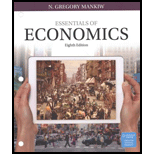
Bundle: Essentials Of Economics, Loose-leaf Version, 8th + Lms Integrated Mindtap Economics, 1 Term (6 Months) Printed Access Card
8th Edition
ISBN: 9781337368087
Author: N. Gregory Mankiw
Publisher: Cengage Learning
expand_more
expand_more
format_list_bulleted
Question
Chapter 10, Problem 8PA
Sub part (a):
To determine
The role of tradable pollution permit in efficiency.
Sub part (b):
To determine
The role of tradable pollution permit in efficiency.
Expert Solution & Answer
Trending nowThis is a popular solution!

Students have asked these similar questions
Please help and Solve! (Note: this is a practice problem)
Please help and thanks! (Note: This is a practice problem!)
Unit VI Assignment
Instructions: This assignment has two parts. Answer the questions using
the charts.
Part 1:
Firm 1
High Price
Low Price
High Price
8,8
0,10
Firm 2
Low Price
10,0
3,3
Question: For the above game, identify the Nash Equilibrium. Does Firm 1 have a
dominant strategy? If so, what is it? Does Firm 2 have a dominant strategy? If so,
what is it?
Your response:
Chapter 10 Solutions
Bundle: Essentials Of Economics, Loose-leaf Version, 8th + Lms Integrated Mindtap Economics, 1 Term (6 Months) Printed Access Card
Ch. 10.1 - Prob. 1QQCh. 10.2 - Prob. 2QQCh. 10.3 - Prob. 3QQCh. 10 - Prob. 1CQQCh. 10 - Prob. 2CQQCh. 10 - Prob. 3CQQCh. 10 - Prob. 4CQQCh. 10 - Prob. 5CQQCh. 10 - Prob. 6CQQCh. 10 - Prob. 1QR
Ch. 10 - Prob. 2QRCh. 10 - Prob. 3QRCh. 10 - Prob. 4QRCh. 10 - Prob. 5QRCh. 10 - Prob. 6QRCh. 10 - Prob. 1PACh. 10 - Prob. 2PACh. 10 - Greater consumption of alcohol leads to more motor...Ch. 10 - Prob. 4PACh. 10 - The many identical residents of Whoville love...Ch. 10 - Prob. 6PACh. 10 - Prob. 7PACh. 10 - Prob. 8PACh. 10 - Prob. 9PA
Knowledge Booster
Similar questions
- not use ai please don't kdjdkdkfjnxncjcarrow_forwardAsk one question at a time. Keep questions specific and include all details. Need more help? Subject matter experts with PhDs and Masters are standing by 24/7 to answer your question.**arrow_forward1b. (5 pts) Under the 1990 Farm Bill and given the initial situation of a target price and marketing loan, indicate where the market price (MP), quantity supplied (QS) and demanded (QD), government stocks (GS), and Deficiency Payments (DP) and Marketing Loan Gains (MLG), if any, would be on the graph below. If applicable, indicate the price floor (PF) on the graph. TP $ NLR So Do Q/yrarrow_forward
- Now, let us assume that Brie has altruistic preferences. Her utility function is now given by: 1 UB (xA, YA, TB,YB) = (1/2) (2x+2y) + (2x+2y) What would her utility be at the endowment now? (Round off your answer to the nearest whole number.) 110arrow_forwardProblema 4 (20 puntos): Supongamos que tenemos un ingreso de $120 y enfrentamos los precios P₁ =6 y P₂ =4. Nuestra función de utilidad es: U(x1, x2) = x0.4x0.6 a) Planteen el problema de optimización y obtengan las condiciones de primer orden. b) Encuentren el consumo óptimo de x1 y x2. c) ¿Cómo cambiará nuestra elección óptima si el ingreso aumenta a $180?arrow_forwardPlease draw the graph for number 4 and 5, I appreciate it!!arrow_forward
- not use ai pleasearrow_forwardnot use ai pleasearrow_forward• Prismatic Cards: A prismatic card will be a card that counts as having every suit. We will denote, e.g., a prismatic Queen card by Q*. With this notation, 2.3045 Q would be a double flush since every card is a diamond and a heart. • Wild Cards: A wild card counts as having every suit and every denomination. Denote wild cards with a W; if there are multiple, we will denote them W₁, W2, etc. With this notation, W2 20.30054 would be both a three-of-a-kind (three 2's) and a flush (5 diamonds). If we add multiple wild cards to the deck, they count as distinct cards, so that (e.g.) the following two hands count as "different hands" when counting: W15 5Q and W255◊♡♡♣♣ In addition, 1. Let's start with the unmodified double-suited deck. (a) Call a hand a flush house if it is a flush and a full house, i.e. if all cards share a suit and there are 3 cards of one denomination and two of another. For example, 550. house. How many different flush house hands are there? 2. Suppose we add one wild…arrow_forward
- not use ai pleasearrow_forwardIn a classic oil-drilling example, you are trying to decide whether to drill for oil on a field that might or might not contain any oil. Before making this decision, you have the option of hiring a geologist to perform some seismic tests and then predict whether there is any oil or not. You assess that if there is actually oil, the geologist will predict there is oil with probability 0.85 . You also assess that if there is no oil, the geologist will predict there is no oil with probability 0.90. Please answer the two questions below, as I am trying to ensure that I am correct. 1. Why will these two probabilities not appear on the decision tree? 2. Which probabilities will be on the decision tree?arrow_forwardAsap pleasearrow_forward
arrow_back_ios
SEE MORE QUESTIONS
arrow_forward_ios
Recommended textbooks for you
 Economics (MindTap Course List)EconomicsISBN:9781337617383Author:Roger A. ArnoldPublisher:Cengage Learning
Economics (MindTap Course List)EconomicsISBN:9781337617383Author:Roger A. ArnoldPublisher:Cengage Learning
 Essentials of Economics (MindTap Course List)EconomicsISBN:9781337091992Author:N. Gregory MankiwPublisher:Cengage Learning
Essentials of Economics (MindTap Course List)EconomicsISBN:9781337091992Author:N. Gregory MankiwPublisher:Cengage Learning
 Principles of Economics (MindTap Course List)EconomicsISBN:9781305585126Author:N. Gregory MankiwPublisher:Cengage Learning
Principles of Economics (MindTap Course List)EconomicsISBN:9781305585126Author:N. Gregory MankiwPublisher:Cengage Learning Principles of Microeconomics (MindTap Course List)EconomicsISBN:9781305971493Author:N. Gregory MankiwPublisher:Cengage Learning
Principles of Microeconomics (MindTap Course List)EconomicsISBN:9781305971493Author:N. Gregory MankiwPublisher:Cengage Learning

Economics (MindTap Course List)
Economics
ISBN:9781337617383
Author:Roger A. Arnold
Publisher:Cengage Learning


Essentials of Economics (MindTap Course List)
Economics
ISBN:9781337091992
Author:N. Gregory Mankiw
Publisher:Cengage Learning


Principles of Economics (MindTap Course List)
Economics
ISBN:9781305585126
Author:N. Gregory Mankiw
Publisher:Cengage Learning

Principles of Microeconomics (MindTap Course List)
Economics
ISBN:9781305971493
Author:N. Gregory Mankiw
Publisher:Cengage Learning